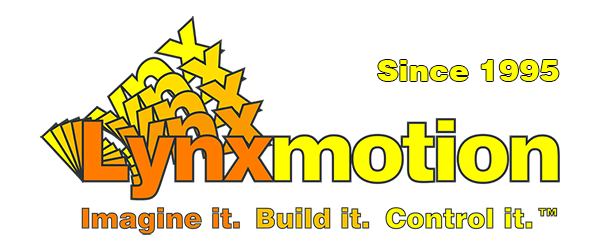Changes for page LSS FlowArm - Setup
Last modified by Eric Nantel on 2023/02/21 10:31
Change comment: There is no comment for this version
Summary
-
Page properties (1 modified, 0 added, 0 removed)
-
Attachments (0 modified, 2 added, 0 removed)
Details
- Page properties
-
- Content
-
... ... @@ -14,27 +14,19 @@ 14 14 | |(% colspan="4" %)5. The software sends a query to servo ID1 and once a reply is received, it determines connection has been established and a green light will be displayed aside the COM port. 15 15 | |(% colspan="2" %){{lightbox image="LSS-FlowArm-COM-Searching.png"/}}|(% colspan="2" %){{lightbox image="LSS-FlowArm-COM-Found.png"/}} 16 16 17 -= Connecting via USB = 18 - 19 -1. Connect the USB cable to the LSS Adapter board on your robot 20 -1. Plug the USB connector into the PC 21 -1. Connect your LSS to the LSS-Adapter with the Lynxmotion cable 22 -1. Connect the power to the LSS Adapter via the yellow XT60 plug 23 -1. Power on the robot (On/Off switch) 24 -1. Start the LSS FlowArm software 25 -1. Select the type of LSS Arm you are using (3 DoF / 4 DoF / 5 DoF) 26 -1. It will automatically try to find the connected Arm but, if not, you can manually choose the appropriate COM port from the drop-down list & the baud rate (default is 115200) 27 -1. The software sends a query to servo ID1 and once a reply is received, it determines connection has been established and a green light will be displayed aside the COM port. 28 - 29 -= Calibration = 30 - 31 -1. Go in "TEACH" mode with the button on the top bar. 32 -1. Manually place the arm in the correct position for your model and with the gripper closed. (see images bellow) 33 -1. Store the values or Offsets by clicking "STORE OFFSETS" 34 -1. At that point the arm should "stay" in that position once released 35 -1. Exit the "TEACH" mode by clicking it again 36 - 37 -= Calibration Positions = 38 - 39 -|(% colspan="2" rowspan="1" style="text-align:center; vertical-align:middle" %)**4 DoF**|(% colspan="2" rowspan="1" style="text-align:center; vertical-align:middle" %)**3 DoF ** 40 -|(% style="text-align:center; vertical-align:middle" %)[[image:[email protected]||width="200"]]|(% style="text-align:center; vertical-align:middle" %)[[image:[email protected]||width="200"]]|(% style="text-align:center; vertical-align:middle" %)[[image:[email protected]||width="200"]]|(% style="text-align:center; vertical-align:middle" %)[[image:[email protected]||alt="lss-flowarm-left-3dof.png" width="200"]] 17 +(% style="width:700px" %) 18 +|(% colspan="5" %)**Calibration (Store Offsets)** 19 +|(% style="width:10px" %) |(% colspan="4" %)((( 20 +1. Go in "TEACH" mode with the button on the top bar. 21 +))) 22 +|(% style="width:10px" %) |(% colspan="4" %){{lightbox image="LSS-FlowArm-Teach.png"/}} 23 +|(% style="width:10px" %) |(% colspan="4" rowspan="1" %)((( 24 +2. Manually place the physical arm in the correct position for your model and with the gripper closed and keep it in this position until the next step is done. (see images bellow) 25 +))) 26 +|(% style="width:10px" %) |(% colspan="2" style="text-align:center; width:345px" %)4DOF / 5DOF|(% colspan="2" style="text-align:center; width:345px" %)3DOF 27 +|(% style="width:10px" %) |(% colspan="4" %){{lightbox image="LSS-FlowArm-Calibration.png"/}} 28 +|(% style="width:10px" %) |(% colspan="4" %)3. Store the values or Offsets by clicking "STORE OFFSETS" 29 +|(% style="width:10px" %) |(% colspan="4" %){{lightbox image="LSS-FlowArm-Store-Offsets.png"/}} 30 +|(% style="width:10px" %) |(% colspan="4" %)4.At that point the arm should "stay" in that position once released 31 +|(% style="width:10px" %) |(% colspan="4" %)5. Exit the "TEACH" mode by clicking it again 32 +|(% style="width:10px" %) |(% colspan="4" %)
- LSS-FlowArm-Calibration.png
-
- Author
-
... ... @@ -1,0 +1,1 @@ 1 +xwiki:XWiki.ENantel - Size
-
... ... @@ -1,0 +1,1 @@ 1 +139.5 KB - Content
- LSS-FlowArm-Teach.png
-
- Author
-
... ... @@ -1,0 +1,1 @@ 1 +xwiki:XWiki.ENantel - Size
-
... ... @@ -1,0 +1,1 @@ 1 +85.5 KB - Content

